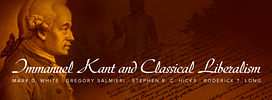Professor Salmieri and Professor Long have drawn our attention to the tricky issue of the relationship between philosophical principles and practical application.
Long advocates a sensible moderate position, noting that thinkers can be more or less accurate about the actual connections between their principles and their practical policies, so on a case by case basis (especially in the case of Kant) we should be open to the possibility of separating a thinker’s philosophical and practical claims.
Salmieri suggests a tighter connection between philosophical principle and practical application, with the intriguing suggestion that major thinkers who apparently agree over practical matters do not in fact do so when one considers the philosophical justification of their practical positions.
In his response, Professor White agrees that there are many non-liberal and many liberal elements in Kant’s practice. At the same time, in response to the troubling elements in Kant’s basic philosophy, he adopts a more radical severance of basic philosophy from normative application, suggesting that we can use Kant’s ethics “without being overly concerned about metaphysical complications.”
I’d like to take up this point of method, as I disagree with White: When looking for a philosophical justification of liberalism, we must be overly concerned about metaphysical complications. Especially in the case of interpreting and using a philosopher such as Kant—a systematic philosopher if ever there were one—selecting what one likes from his ethics and omitting the metaphysical context runs the risk of cherry-picking on a grand philosophical scale.
Consider two simple examples to begin:
Two women explain why they cook for their families. The first says, Because I love cooking and I love my family. The second says, Because it’s my duty as the woman. As a matter of practice, both women consistently engage in the activity of cooking, so we can categorize them as cooks. But because their reasons for their actions are so different, it is questionable whether they belong in the same category as principled advocates of cooking.
In a second example, consider three people who believe that one should be truthful. When asked why, they say the following:
1: Because people will trust you, and want to be friends, and do business with you, and that will make you happy.
2: Because your parents and teachers told you to tell the truth, and you should obey them.
3: Because you will burn in Hell if you tell a lie.
As a matter of practical action, all three may be equally truthful. But when the action is bundled with the justification, their philosophies of truth-telling diverge significantly.
The philosophical principles become more important when we are categorizing “isms” (such as classical liberalism is meant to be), which bundle or integrate many principles, and when we are deciding which thinkers should be categorized in which ism.
To step up from the two simple examples to a more complicated one. Suppose that one were attracted to Christian ethics and its emphasis upon charity and forgiveness—but added that one doesn’t pay much or any attention to the talk about God, the revelations to the prophets, and the resurrection of Jesus in Christian theology. In this example, one separates the normative claims of Christianity from the metaphysical and epistemological claims. But by jettisoning the Christian metaphysics and epistemology, one is no longer defending Christian ethics. One might still advocate charity and forgiveness, but one’s advocacy is not uniquely Christian. Partly this is because many ethics in many religious and naturalist philosophies advocate charity and forgiveness, so a free-floating advocacy is no longer specifically Christian. Partly this is also because the Christian religion is intended by its creators to involve the entire Christian theological package.
In the same way, a “Kantian” ethicist is arguably not a Kantian ethicist to the extent that he or she is unaware, uninterested in, or actively jettisons the metaphysical and epistemological underpinnings of Kantian ethics.
Autonomy and dignity are not free-floating abstract qualities. One must specify the subject: Who or what is autonomous or dignified? And Kant is clear that he means the noumenal, not the phenomenal, self. Consequently, a principled stress upon autonomy and dignity alone is not sufficient to make one a Kantian, especially as other philosophers—Aristotle, Thomas Aquinas, and John Locke are prominent examples—have also stressed and defended the autonomy and dignity of human beings. A Kantian autonomous-and-dignified self is differentiated from the Aristotelian, Thomistic, or Lockean autonomous-and-dignified selves precisely by means of the differences in the underlying metaphysics. And that means we must always integrate a philosopher’s metaphysics with his or her normative philosophy.

